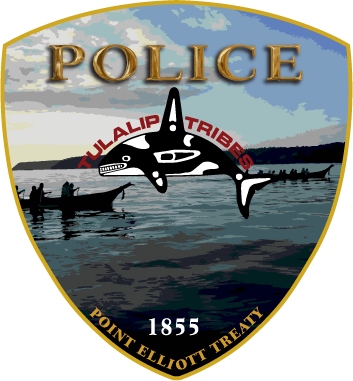Administration
Responsibilities of the Chief of Police
The Chief of Police has jurisdiction within the exterior boundaries of the Tulalip Reservation along with the Usual and Accustomed areas and line command authority over sworn and civilian employees. The official duties of the Chief of Police are described in the Tulalip Tribal Code Title 2, Chapter 2.45 Police Department Section 2.45.020 Chief of Police.
In order to protect persons, property and the preservation of peace in the community, the Chief of Police directs, plans, and coordinates the enforcement of tribal, state and federal laws. During a law enforcement critical incident such as a civil disturbance on the Reservation, the Chief of Police assumes a leadership role in planning, coordinating, and directing all activities aimed at restoring peace on the Reservation or otherwise returning conditions to normal.
The Chief of Police confers with citizens, the Tulalip Citizens Advisory Review Board, Tribal Council, the state and national legislative bodies on law enforcement matters of importance to the Tulalip Tribes, as well as proposing new or amending existing laws which could have an impact on law enforcement in Indian Country. The Chief of Police meets with the Tulalip Citizens Advisory Review Board to keep commission members informed and to respond to citizens’ complaints or concerns.
The Chief of Police acts on all matters related to disciplinary issues and recommends awards for exemplary conduct of the department’s sworn and civilian employees. The Chief of Police also makes presentations to private citizens’ community groups, churches, schools, and businesses in the community to promote the goals and missions of the Police Department and to solicit their input. The Chief of Police provides strong leadership in delivering quality policing services fairly and equitably that enhances the quality of life for those that live, work, and visit the Tulalip Reservation.
Administrative Support Unit
The Administrative Support Unit is the first line of contact for citizens wishing to see or speak to the Chief or other members of the staff.
The Administrative Support Unit is led by the Office Manager with the support of an Administrative Assistant who provides office and liaison support for the Chief of Police and the department overall.
Some responsibilities include:
- Front Desk Reception and Customer Service
- Financial and Budget Management
- Property Inventory and Materials Control
- Personnel File Management
- Managing both Internal and External Communications
- Special Events Coordination
Open Monday through Friday from 8:00 AM to 4:30 PM and closed on holidays.
Phone number: 360‑716‑5904
Fax number: 360‑716‑5999
Address:6332 31st Ave NE, Suite ATulalip, WA 98271
Communications & Records Unit
The Communications & Records Unit is led by the Communications/Records Supervisor and supported by a team of Communication Officers who perform the duties of dispatch and police records management. The unit ensures that emergency/non-emergency calls for service are received and handled in the best interest of the Tulalip Tribal community.
Dispatch receives over 24,000 calls a year, and approximately 530 calls are from surrounding agencies. Tulalip Police handle many types of calls ranging from domestic violence, assaults, and motor vehicle accidents to animal control complaints. In the previous year, officers completed over 4,500 case reports.
Communication Officers’ duties include answering multiple phone lines, working with a computer-aided dispatch system, and operating a two-way radio to communicate to officers on the road. Additionally, Dispatcher/Records staff provides records management for warrants, court documents, and driving histories.
RELEASE OF RECORDS:
Requests for access to public records shall be directed to the Records Division of the Tulalip Police Department (TTPD). This office is open between the hours of 8 a.m. and 4:30 p.m. Monday through Friday, with the exception of holidays. All public requests must be made on a “Tulalip Police Department Request for Official Information” form. Outside Criminal Justice Agencies may email or fax a request using their agency or department’s official header. Third-party requestor’s such as Personal Attorneys, Insurance Companies, Lien Holders, Non-Defense Private Investigators, LexisNexis, etc., may email or fax a request using their official header.
The release of all reports, records, photographs, etc, other than criminal history information records, shall be the responsibility of the Records Division. Applicable fees shall be charged for copies of these documents.
The Records Division shall be guided by the following procedures:
Criminal Cases - When criminal charges are pending or anticipated the case agent must be contacted and approve the release prior to disclosure. When no criminal charges are pending or anticipated, incident reports, crash reports and photographs may be released.
EXCEPTIONS:
Witness statements and follow-up investigative reports shall not be released. These types of reports must be subpoenaed by court order. Names, addresses, etc. of juvenile offenders or other juveniles noted in reports shall be redacted from such reports prior to release.
Name(s), addresses, etc., of persons who appear on incident reports shall be redacted prior to release when a determination is made that there are safety and/or privacy concerns that need to be protected.
The appropriate fees shall be charged for each released report, unless the person making the request is the listed victim, parent/guardian, of the case.
Media Requests:
The official business of the Community, the Tulalip Police Department, the Records Division and its User’s shall be treated as confidential. Employees shall not release any information to any person not affiliated with the Records Division, the Tulalip Police Department or its User agencies. An attempt will be made to accommodate requests in covering news stories by forwarding requests on to the PIO.
The TTPD is not subject to Washington’s open records laws. However, requests may be made to the Tulalip Tribal Council, which is the governing body of the TTPD.
“The Tulalip Tribal of Washington (“TTT”) is a federally-recognized Indian tribe. The laws of Washington are not generally applicable within the boundaries of the Tulalip Tribes. Therefore, the Tulalip Tribes is not subject to Washington’s open records laws.”
Tribal records are not subject to the Freedom of Information Act and Federal Privacy Act.
“The records of the Self-Governance Tribe shall not be considered Federal records for purposes of chapter 5 of title 5, United States Code.” (RESEARCH)
Hours of operation: 24/7
Emergency: 360‑716‑9911
Dispatch Non-Emergency: 360‑716‑4608
Please click the link to complete the Police Report Request Form
Professional Standards Unit
The Professional Standards Unit (PSU) was recently added in November of 2019 and is considered an extension of the Chief of Police. This unit helps the department meet and exceed the high expectations of professional conduct for the Tulalip Police Department.
The Professional Standards Unit is led by the Professional Standards Manager, who receives and investigates all allegations of misconduct or wrongdoing against the department or department employees. Without regard to the source, the Professional Standards Unit is charged to conduct a fair and neutral examination of all available information. Citizens are encouraged to contact the Office of the Chief if they wish to express satisfaction or disappointment concerning their interaction with a sworn or civilian employee of the department.
The Professional Standards Unit also conducts:
- Recruitment and Pre-Employment Background Investigations
- Policy and Procedure Maintenance and Development
- Internal Audit of Department Compliance with Policies
Please click on the link to submit a Citizen Feedback Form.
Open Monday through Friday from 8:00 AM to 4:30 PM and closed on holidays.
Phone: 360‑716‑5902
Training Unit
The Training Unit is responsible for coordinating all aspects of the department training function, including planning, performing, and scheduling training for all department personnel. The Training Unit is led by a Sergeant who works in collaboration with other Training Unit staff to accomplish the unit’s mission. The Training Unit will also act as a liaison with outside law enforcement entities and training vendors on local, state, and national levels to provide department-wide training.


